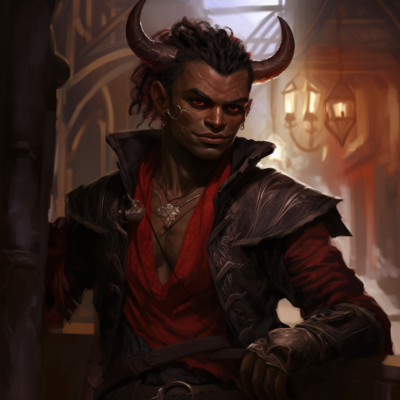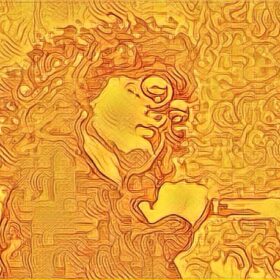News, Swords of the Serpentine
Playtesting Rules: Non-Human Heroes in Swords of the Serpentine
 by Kevin Kulp
by Kevin Kulp
Classic sword and sorcery stories feature human heroes almost exclusively, but that doesn’t mean your game needs to look like this. If you want to use the GUMSHOE Swords of the Serpentine rules for high- or epic fantasy, you’ll want access to non-human heroes. This monthly series will feature Ancestries for non-human heroes; each month’s new Ancestry will provide descriptions and backgrounds, narrative hooks, rules information, a sample Hero, a sample Adversary, and unique Allegiance information.
Some Ancestries are a better match for sword and sorcery than others. For ease of play, we’ll start by introducing Ancestries that fit fairly easily into a game set in Eversink without disrupting the current tone or balance of the game setting. You won’t need to majorly rework the setting’s assumptions (unless you choose to) when using them. A note of caution: too many (however you define that term) non-human Heroes could change the tone of a sword & sorcery game, so talk to your GM before you create your Hero.
Creating a Non-Human Hero
To play a non-human Hero in Swords of the Serpentine, create your Hero using a non-human Ancestry instead of professions like Sentinel, Sorcerer, Thief, and Warrior.
What’s an Ancestry?
Ancestries are similar to professions (SotS, p. 13); each gives you starting access to four different Investigative abilities that define your Hero. Ancestries, however, draw their abilities from across multiple professions and always include one unique new Ancestry ability. You’ll gain a bonus Build point if you spend all of your starting Investigative Build points in your Ancestry abilities, Social abilities, or Allegiances.
You want to play an intelligent animal, such as a sentient raven or cat. To do so you choose the Intelligent Animal Ancestry instead of a profession such as Warrior or Thief. Playing an intelligent animal gives you starting access to four specific Ancestry abilities associated with Intelligent Animals, as listed in the full description, which you can find here.
- Ancestry (Animal Kingdom) encompasses your instinctive animal knowledge and skill for fitting into the wild kingdom, as well as any special abilities such as a bird’s flight
- Ridiculous Luck (from the Thief profession) reflects your natural advantages in a world run by humans instead of animals
- Vigilance (from the Sentinel profession) represents your naturally keen eyesight, hearing, or sense of smell
- Wilderness Mastery (from the Warrior profession) reflects your ability to navigate, manipulate, and thrive in the natural wilderness
You assign Investigative Build Points however you wish. If you assign all your starting Investigative ranks to these four abilities (along with whatever Social and Allegiance Investigative abilities you like), you’ll gain a bonus Investigative Build Point you can use on these four abilities or any Social and Allegiance Investigative ability.
You can only choose one Ancestry, and only when first creating your non-human hero. If your Hero turns from fully human to non-human during play, such as becoming a drowned, ghost, or rattakan, your GM will make the appropriate Ancestry Investigative ability available to you and will allow you the opportunity to shift your Investigative points around.
Ancestry Investigative abilities aren’t available to human Heroes unless the GM specifically allows it, and even then only under specific and unusual circumstances.
Games using non-human heroes may use Ancestry-specific Allegiances that are different from standard factions, as described in the Ancestries below. Ask your GM.
What Do Ancestries Represent?
Selecting an Ancestry instead of a profession is a big deal because that’s how you mechanically establish yourself as non-human. Ancestries give you access to pre-selected Investigative abilities that define a specific non-human culture. We want you to look at those pre-selected abilities and say, “oh sure, that’s exactly what this culture should feel like.” It’s not a straitjacket; you can choose other abilities for your non-human Hero if you prefer, giving up a bonus Build point in exchange for flexibility. It’s just like a profession in that regard.
The most important of an Ancestry’s four abilities is the Ancestry Investigative Ability that ties into its cultural heritage. For instance, Chuggut (SotS p. 185) are the inhuman toad-folk who live in the swamps outside of Eversink. A Chuggut Hero with no ranks in the Investigative ability Ancestry (Chuggut) has probably been raised as a human and doesn’t know anything about what it’s like to BE a Chuggut. In comparison, a Chuggut Hero with 3 ranks of Ancestry (Chuggut) is fully steeped in her culture’s heritage, traditions, and secret knowledge.
The abilities we chose to define each Ancestry deliberately stretch across multiple professions. When designing your own unique non-human Ancestries from scratch, always choose abilities that come from two or (preferably) three different professions. This helps make Ancestries feel distinct from professions and encourages well-rounded heroes.
Player Advice: Playing a Non-Human Hero
If you want to play a non-human, select the appropriate non-human Ancestry even if you don’t want to start with any Build Points whatsoever in any of the four default abilities it grants you. This will guarantee you still have access to your Ancestry Investigative Ability when you later gain Advancement Points from adventuring. That Ancestry ability is the one thing that mechanically sets you apart from humans, so you probably don’t want to miss it.
You want to play someone infected by the sentient fungal Colony (SotS p. 87) who starts off acting human but who gradually learns about their fungal connection during play. You start with The Drowned Ancestry instead of picking a Profession. You choose not to put any points into the Ancestry (Drowned) ability to start, because you want to use Advancement points gained while adventuring to increase ranks in this ability.
What Comes Next?
We’ll have a different non-human Ancestry appearing each month in Pelgrane’s Patreon, which will then appear in See Page XX in the following month. Patreon access gets you the information earlier, but all Ancestries that appear there will make their way here to See Page XX. Our current schedule for the next six months:
- Intelligent Animals (not humanoid; from mice up to bears, including intelligent cats, available now!) [insert link]
- Unsleeping Advisors (undead repositories of family knowledge)
- Constructs (wood, stone, or metal constructs that might include clockwork, magically animated statues, or gargoyles)
- Drowned (a sentient fungal hivemind hiding inside of humans)
- Considerata (humans with contractually mandated divine power)
- Ghosts (the still-active souls of dead adventurers)
- And many more to come.
Kevin Kulp (@kevinkulp) and Emily Dresner (@multiplexer) are the co-authors of Swords of the Serpentine, out now in hardback and PDF. Kevin previously helped create TimeWatch and Owl Hoot Trail for Pelgrane Press. When he’s not writing games he’s either smoking BBQ or helping 24-hour companies with shiftwork, sleep, and alertness.


